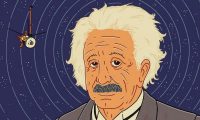
100 years on, is this Einstein’s greatest gift to human understanding?
History may judge 2015 as the year when mankind opened up a completely new window on the universe, exactly a century after Albert Einstein laid the scientific foundations for it. The excitement concerns the possibility of detecting one of nature’s most elusive phenomena – gravitational waves – which could pave the way for a much better understanding of black holes, neutron stars and other violent astronomical systems.
Several new projects have been launched in the past few months to make gravitational waves the Next Big Thing in astronomy. Rumours have it that one of these – the US’s Advanced Laser Interferometer Gravitational-Wave Observatory (Advanced Ligo) – already “detected something” in September, but the scientists involved remain tight-lipped.… Seguir leyendo »
